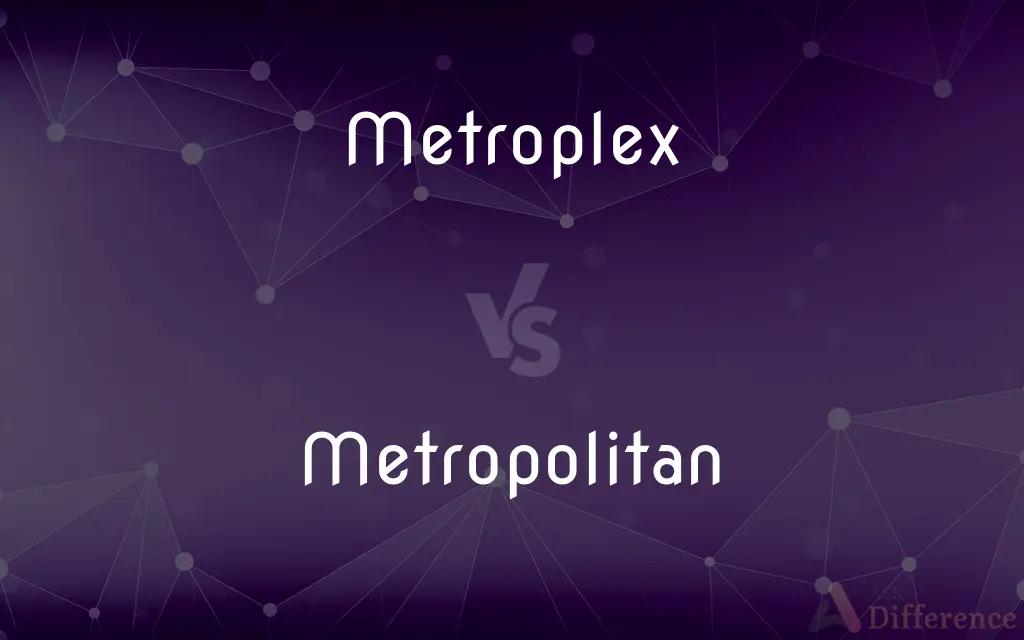Metroplex vs. Metropolitan — What's the Difference?
By Tayyaba Rehman & Maham Liaqat — Updated on March 15, 2024
Metroplex refers to a large metropolitan area with multiple cities and towns, while Metropolitan pertains to a major city and its surrounding areas.

Difference Between Metroplex and Metropolitan
Table of Contents
ADVERTISEMENT
Key Differences
Metroplex is a term often used to describe a large metropolitan area that encompasses multiple cities and towns, interconnected economically and socially. These regions typically have a high degree of integration in terms of infrastructure, such as transportation and communication networks. On the other hand, Metropolitan relates more directly to a central city, usually a significant urban center, and its adjacent areas. This term emphasizes the influence of the central city over its surrounding territories, which may include smaller cities, towns, and rural areas. The metropolitan area is characterized by a shared economy, culture, and often governance, with the central city playing a pivotal role in defining the region's identity.
Metroplexes are often defined by their sprawling nature, covering vast geographical areas that encompass multiple municipalities, each with its unique characteristics and governance. This can lead to a diverse cultural and economic landscape within the same metroplex, with various centers of activity and development.
Metropolitan areas, while also covering large territories, tend to have a more defined center of gravity – the central city. This city is typically the hub of economic, cultural, and social activities, influencing the surrounding areas. The metropolitan concept focuses more on the interconnectedness of the central city with its periphery, rather than the integration among multiple central cities.
The concept of a metroplex might include several metropolitan areas within its scope, reflecting a more complex urban system. This complexity arises from the multiple central cities and their surrounding areas, all contributing to the larger metroplex identity.
Metropolitan areas, in contrast, usually center around a single main city, with a clearer distinction between the urban core and its suburban or rural peripheries. This structure simplifies the identification of the central city as the primary economic and cultural driver for the region.
ADVERTISEMENT
Comparison Chart
Definition
A large area encompassing multiple interconnected cities and towns.
Pertains to a central city and its surrounding urban and rural areas.
Urban Structure
Multiple central cities with their suburbs.
A single central city with its suburbs and peripheries.
Integration
High degree of economic and social integration among cities.
Integration primarily between the central city and surrounding areas.
Geographic Scope
Vast, often covering extensive land areas.
Can be extensive but usually centered around one main city.
Central Focus
Several centers of activity and governance.
A single, dominant urban center driving the region's identity.
Compare with Definitions
Metroplex
Metroplexes cover vast geographical areas, often extending into multiple counties.
The geographic scope of a metroplex like Atlanta spans a wide area, encompassing numerous suburbs and towns.
Metropolitan
Metropolitan pertains to a central city, its suburbs, and exurbs, forming an integrated economic and cultural area.
The New York metropolitan area, with Manhattan at its core, influences a wide range of surrounding areas.
Metroplex
Cities within a metroplex are highly integrated through transportation and communication networks.
The metroplex's extensive highway system facilitates easy travel between its constituent cities.
Metropolitan
The central city is the primary economic, cultural, and social hub of a metropolitan area.
Chicago, as the central city, drives the economic and cultural dynamics of its metropolitan area.
Metroplex
It consists of various municipalities, each potentially with its own urban core.
Within the metroplex, each city, such as Arlington or Plano, operates independently while contributing to the larger area's dynamics.
Metropolitan
A metropolitan area is characterized by a central city and its surrounding suburban and rural areas.
In the metropolitan area, suburbs like Brooklyn and Queens are closely tied to New York City's urban core.
Metroplex
A metroplex is a large urban area encompassing multiple cities and towns that are economically and socially interconnected.
The Dallas-Fort Worth metroplex is one of the largest in the United States, combining multiple cities into a single economic region.
Metropolitan
While metropolitan areas can be large, they are usually centered around a single main city.
The Los Angeles metropolitan area, though extensive, is centered around Los Angeles itself.
Metroplex
There may be multiple centers of activity and governance within a metroplex.
In a metroplex, cities like Fort Worth and Dallas serve as major centers for business, culture, and governance.
Metropolitan
The central city and its surrounding areas are interconnected, sharing infrastructure and services.
The metropolitan area's public transportation system is designed to connect suburbs with the central city efficiently.
Metroplex
A large metropolitan area containing several cities and their suburbs.
Metropolitan
Of, relating to, or characteristic of a major city
Crowded metropolitan streets.
A metropolitan newspaper.
Metropolitan
Of or constituting a large city or urbanized area, including adjacent suburbs and towns
The Dallas-Fort Worth metropolitan area.
A metropolitan county.
Metropolitan
Of, relating to, or constituting the home territory of an imperial or colonial state.
Metropolitan
Of or relating to an ecclesiastical metropolitan.
Metropolitan
A citizen of a metropolis, especially one who displays urbane characteristics, attitudes, and values.
Metropolitan
In the Western Christian churches, a bishop with provincial powers, with some authority over suffragan bishops.
Metropolitan
In most Eastern Orthodox churches, a bishop who is head of an ecclesiastical province and ranks next below the patriarch.
Metropolitan
In the Greek Orthodox church, a bishop ranking next below an archbishop.
Metropolitan
(Orthodox Christianity) A bishop empowered to oversee other bishops; an archbishop.
Metropolitan
The inhabitant of a metropolis.
Metropolitan
(Orthodox Christianity) Pertaining to the see or province of a metropolitan.
Metropolitan
Of, or pertaining to, a metropolis or other large urban settlement.
Metropolitan
Of or pertaining to the parent state of a colony or territory, or the home country, e.g. metropolitan France
Metropolitan
Of or pertaining to the capital or principal city of a country; as, metropolitan luxury.
Metropolitan
Of, pertaining to, or designating, a metropolitan or the presiding bishop of a country or province, his office, or his dignity; as, metropolitan authority.
Metropolitan
The superior or presiding bishop of a country or province.
Metropolitan
An archbishop.
Metropolitan
A bishop whose see is a civil metropolis. His rank is intermediate between that of an archbishop and a patriarch; as, the metropolitan of Constantinople.
Metropolitan
In the Eastern Orthodox Church this title is given to a position between bishop and patriarch; equivalent to archbishop in western Christianity
Metropolitan
A person who lives in a metropolis
Metropolitan
Relating to or characteristic of a metropolis;
Metropolitan area
Common Curiosities
How do transportation networks affect metropolitan areas?
Transportation networks are crucial in metropolitan areas for connecting the central city with its suburbs, supporting commuting, and fostering economic ties.
How does a metropolitan area differ from a city?
A metropolitan area includes not just the central city but also its surrounding suburbs and rural areas, all integrated economically and culturally with the urban core.
What is the significance of a metroplex's integration?
The integration within a metroplex facilitates economic synergy, cultural exchange, and coordinated infrastructure development among its constituent cities.
What defines a metroplex?
A metroplex is defined by its large geographical area that includes multiple interconnected cities and towns, each contributing to the region's economic and social fabric.
Can a metropolitan area be part of a metroplex?
Yes, a metropolitan area can be part of a larger metroplex, which may encompass several metropolitan regions within its geographical scope.
Are all large urban areas considered metroplexes?
Not all large urban areas are considered metroplexes; the term specifically refers to regions with multiple central cities and high inter-city integration.
How does geographic scope differ between metroplex and metropolitan areas?
Metroplexes often cover more extensive geographical areas and may include several metropolitan areas, while metropolitan areas are usually centered around a single city.
What factors contribute to the formation of a metroplex?
Factors include economic interdependence, transportation connectivity, and regional planning efforts that integrate multiple urban areas into a cohesive unit.
What role does a central city play in a metropolitan area?
The central city acts as the primary hub for economic, cultural, and social activities, influencing the surrounding suburban and rural areas.
How does living in a metropolitan area compare to a metroplex?
Living in a metropolitan area often involves closer ties to a single central city, whereas residing in a metroplex might entail a broader connection to multiple urban centers.
Can a metroplex have more than one central focus?
Yes, a metroplex can have multiple centers of activity and governance, reflecting the presence of several significant cities within the region.
What is the impact of a metroplex on regional development?
The presence of a metroplex can stimulate regional development by encouraging economic collaboration, cultural exchange, and infrastructure expansion across multiple cities.
Can a city be part of multiple metropolitan areas?
While less common, it's possible for a city to be part of multiple metropolitan areas, especially in regions where urban boundaries and economic influences overlap.
What are the economic implications of a metroplex?
A metroplex can enhance economic opportunities through a larger, more diversified market, attracting businesses and fostering innovation across multiple cities.
How does urban planning differ between metroplex and metropolitan areas?
Urban planning in a metroplex must consider the needs and dynamics of multiple central cities, whereas in a metropolitan area, planning often centers around optimizing the relationship between a central city and its peripheries.
Share Your Discovery

Previous Comparison
Skill vs. Habit
Next Comparison
Purlin vs. GirtAuthor Spotlight
Written by
Tayyaba RehmanTayyaba Rehman is a distinguished writer, currently serving as a primary contributor to askdifference.com. As a researcher in semantics and etymology, Tayyaba's passion for the complexity of languages and their distinctions has found a perfect home on the platform. Tayyaba delves into the intricacies of language, distinguishing between commonly confused words and phrases, thereby providing clarity for readers worldwide.
Co-written by
Maham Liaqat











































